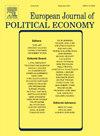Democratic engagement in the shadow of authoritarian repression: Evidence from Chile (2019–2023)
IF 2.4
3区 经济学
Q2 ECONOMICS
引用次数: 0
Abstract
This article analyzes the long-term effects of authoritarian repression on democratic engagement (protests and voting) in Chile, focusing on the 2019–2020 Estallido Social protests and the 2020–2023 constitutional plebiscite process. It uses measures such as the location of military bases before 1970 and the number of victims during Pinochet’s regime to capture the intensity of past repression. The study also examines indicators of contemporary political behavior linked to the legacy of this repression, including public demonstrations, NGO activity, memorial sites, and social media engagement. Two-stage least squares (2SLS) estimates suggest that exposure to political violence continues to shape civic and electoral behavior even after three decades after the end of the dictatorship. Moreover, municipalities more affected by dictatorship-era violence were more likely to protest but less likely to participate in the constitutional plebiscite. These areas did not consistently oppose incumbent politicians or favor independent candidates. Overall, the findings suggest that historical repression can contribute to greater reaction on the streets to political violence and lower levels of electoral engagement in contemporary democracies.
专制镇压阴影下的民主参与:来自智利的证据(2019-2023)
本文分析了独裁镇压对智利民主参与(抗议和投票)的长期影响,重点关注2019-2020年Estallido社会抗议活动和2020-2023年宪法公民投票进程。它使用诸如1970年前军事基地的位置和皮诺切特政权期间的受害者人数等指标来捕捉过去镇压的强度。该研究还考察了与这一镇压遗留问题相关的当代政治行为指标,包括公众示威、非政府组织活动、纪念场所和社交媒体参与。两阶段最小二乘(2SLS)估计表明,即使在独裁统治结束三十年后,暴露于政治暴力仍在影响公民和选举行为。此外,受独裁统治时期暴力影响更大的城市更有可能抗议,但不太可能参与宪法公投。这些地区并不一贯反对现任政治家或支持独立候选人。总的来说,研究结果表明,在当代民主国家,历史上的镇压可能导致街头对政治暴力的更大反应和更低的选举参与水平。
本文章由计算机程序翻译,如有差异,请以英文原文为准。
求助全文
约1分钟内获得全文
求助全文
来源期刊

European Journal of Political Economy
Multiple-
CiteScore
3.40
自引率
10.00%
发文量
106
期刊介绍:
The aim of the European Journal of Political Economy is to disseminate original theoretical and empirical research on economic phenomena within a scope that encompasses collective decision making, political behavior, and the role of institutions. Contributions are invited from the international community of researchers. Manuscripts must be published in English. Starting 2008, the European Journal of Political Economy is indexed in the Social Sciences Citation Index published by Thomson Scientific (formerly ISI).
 求助内容:
求助内容: 应助结果提醒方式:
应助结果提醒方式:


